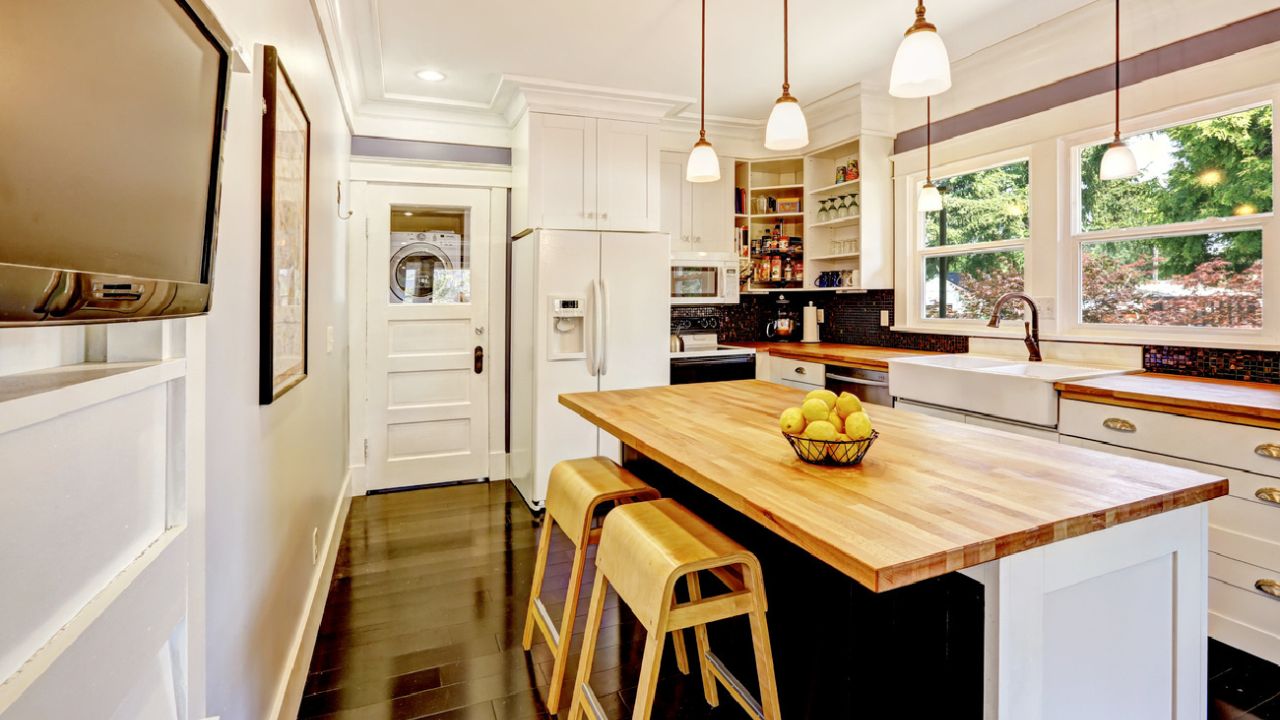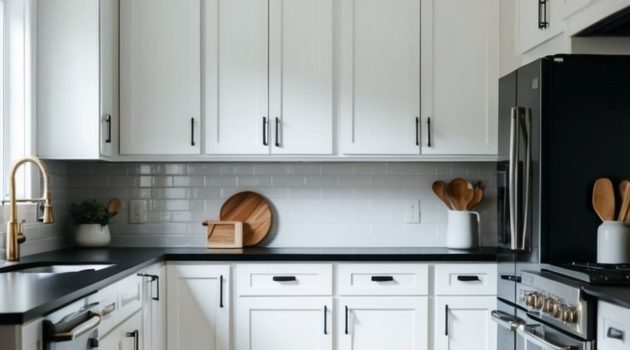When choosing a countertop material for your kitchen, there are numerous options available, and one of these options is bamboo.
Known for its eco-friendly and sustainable properties, bamboo is becoming an increasingly popular choice among homeowners.
In this article, we delve into the various pros and cons of bamboo countertops to help you determine if they’re the right fit for your space.
1. Understanding Bamboo Countertops
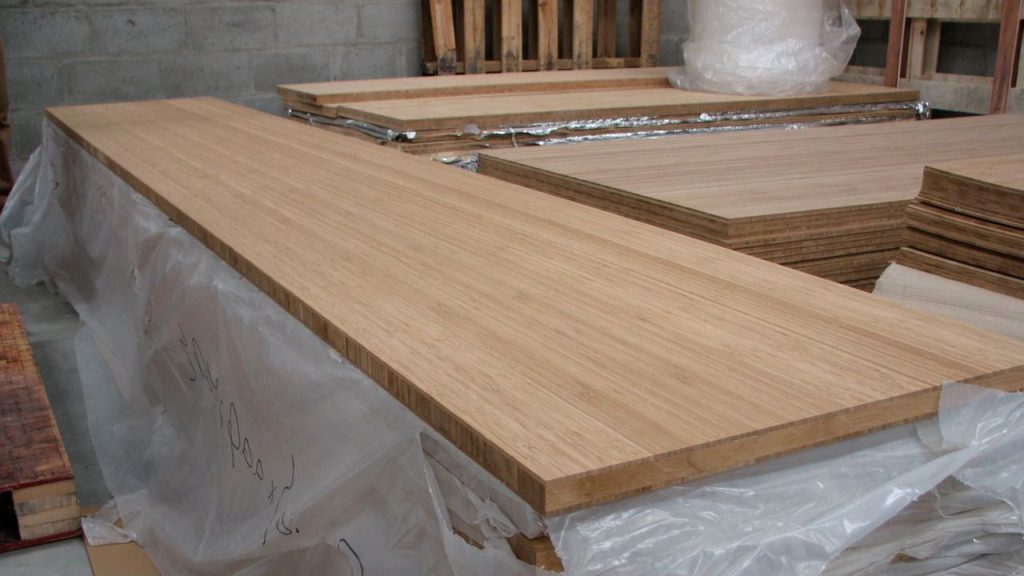
Bamboo as a Material
Bamboo is an eco-friendly, fast-growing grass that can be harvested and used as a natural and versatile material for various applications, including countertops.
It is more sustainable than traditional wood sources like maple and oak, as it regenerates much faster.
Moso bamboo, commonly used for bamboo countertops, can grow up to 3-4 feet per day! This makes it a popular choice for environmentally conscious homeowners.
The Uniqueness of Bamboo Countertops
Bamboo countertops offer a modern look that adds warmth and character to your kitchen or bathroom.
They are available in various colors and finishes, from the natural honey color of bamboo to the rich, dark brown hue achieved through carbonization.
Bamboo countertops can also be visually customizable, allowing you to choose between a vertical or horizontal grain pattern, giving your space a distinct appearance.
Some key features of bamboo countertops include:
- Eco-friendly: Bamboo is a renewable resource, making it a more sustainable choice than traditional wood materials.
- Durable: Bamboo countertops are hard and resilient, capable of withstanding daily wear and tear.
- Antibacterial: Bamboo is naturally resistant to bacteria, mold, and mildew growth.
How It Compares to Other Materials
When comparing bamboo to other countertop materials, you’ll find that it balances aesthetics, durability, and sustainability.
Here’s how bamboo stacks up against some common countertop materials:
- Wood: Bamboo is generally more sustainable and eco-friendly than hardwood countertops like maple or oak. However, both options provide a warm and natural look and are suitable for food preparation.
- Granite and Marble: These stone materials are more heat resistant than bamboo but require more maintenance and can be prone to staining. They also have a higher price point, making bamboo a more budget-friendly option.
- Laminate and Plywood: While these materials may be more affordable, they often offer different durability, aesthetics, and eco-friendliness than bamboo countertops.
- Corian and Other Solid Surfaces: These artificial materials, while customizable and easy to clean, do not have the warmth, natural appeal, or earth-friendly quality of bamboo.
2. The Benefits of Bamboo Countertops
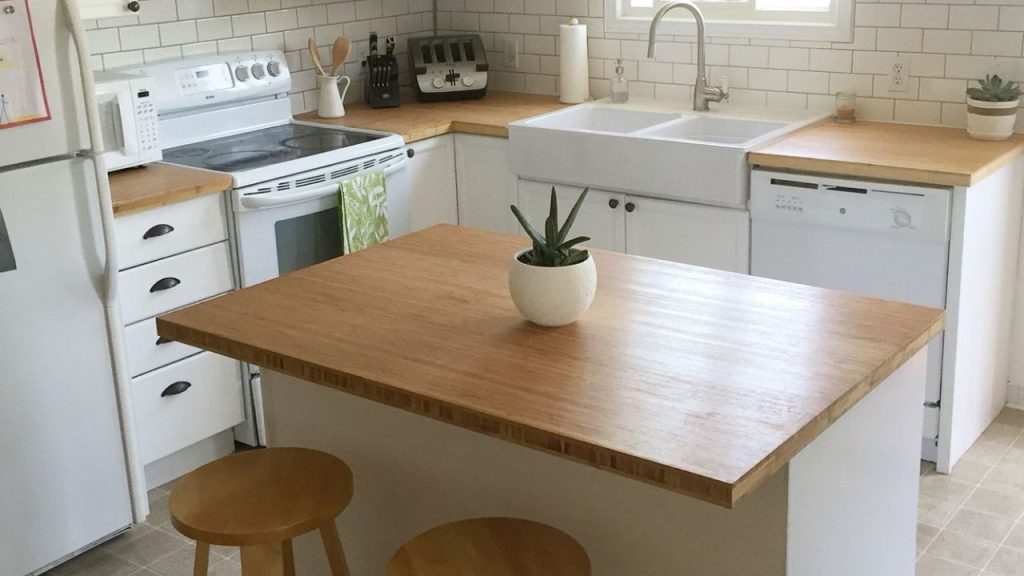
Durability and Longevity
Bamboo countertops are not only strong and sturdy, but they also have an impressive lifespan. Due to their hard and durable nature, they can withstand your kitchen’s daily wear and tear.
Bamboo is naturally resistant to bacteria, preventing mold and mildew growth.
If your countertop gets scratched, bamboo can easily be re-sanded and re-sealed, making it a long-lasting option for your home.
Environmental Friendliness
One of the most significant advantages of choosing bamboo countertops is their eco-friendliness. Bamboo is a sustainable resource that grows rapidly, taking less space than other materials.
Not only is it a renewable resource, but it also requires less water and fewer chemicals to grow.
By opting for bamboo countertops, you’ll be positively impacting the environment by reducing your reliance on non-renewable resources.
Attractive and Stylish
Bamboo countertops offer an aesthetically pleasing look to any kitchen. Available in various finishes, colors, and stains, a style will likely suit your desired aesthetic.
The unique appearance of bamboo adds a warm, natural feel to your home, enhancing your kitchen’s design and giving it a stylish touch.
Affordable and Versatile
Bamboo countertops provide an affordable alternative to other materials like quartz, marble, or granite.
The lower cost is mainly due to the short time to grow bamboo and its simple manufacturing process.
Furthermore, bamboo is a flexible option, lending itself well to different designs and layouts in your kitchen. This combination of affordability and versatility makes bamboo an attractive choice for many homeowners.
3. The Drawbacks of Bamboo Countertops
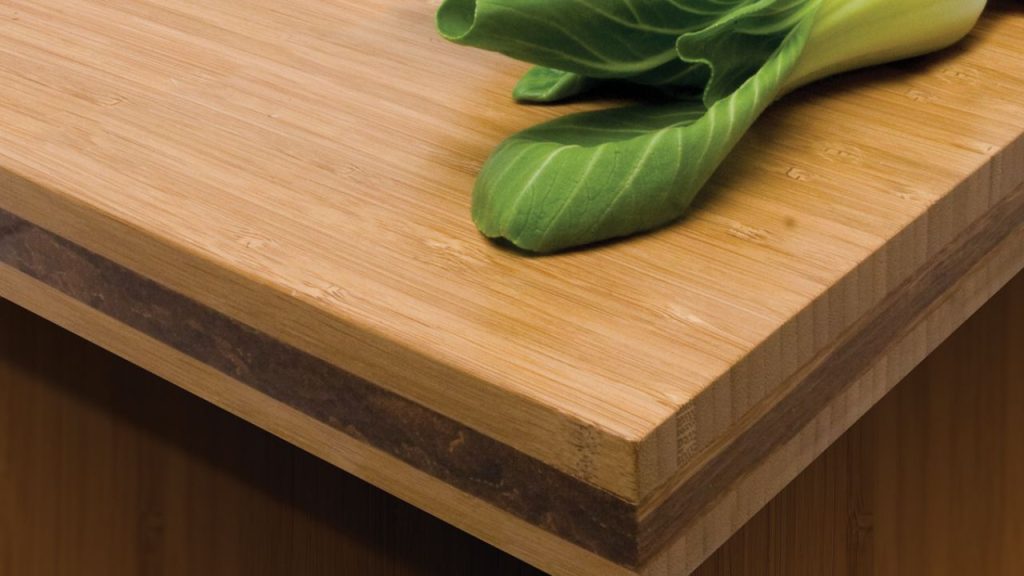
Potential Damage
While bamboo is known for being a strong material, it may be less durable when compared to options like granite or quartz.
Bamboo countertops can be susceptible to denting and chipping, compromising their appearance over time. Additionally, bamboo may not be as resistant to heat as other counterparts.
Placing hot pots and pans on bamboo countertops may cause scorch marks, resulting in a less attractive surface.
Another concern is water damage. Although bamboo is a tough material, it can absorb water and swell if spills aren’t cleaned up quickly.
This may lead to issues such as warping and potential mold growth.
Another potential drawback is visible seams when the countertop is installed; it is essential to consider this if you want a smooth appearance.
Cost and Expenses
Bamboo is a more affordable option compared to some other countertop materials. However, some finishes, colors, and stains might increase the cost.
Additionally, if the countertop must be sealed or undergo occasional maintenance, you will need to factor in these expenses while calculating the long-term costs of your bamboo countertop.
Maintenance Requirements
Bamboo countertops require regular maintenance to keep them looking their best and to preserve their long-lasting nature.
For example, these surfaces are more prone to stains, so cleaning up any spills immediately is essential to prevent any lasting marks.
Moreover, occasional sealing may be necessary to retain bamboo’s water-resistant properties.
This maintenance might concern some homeowners who want a low-maintenance kitchen surface.
Although some minor damages to bamboo can be easily repaired, remember that regular maintenance is crucial for keeping your bamboo countertop in optimal condition.
4. Maintaining and Caring for Bamboo Countertops
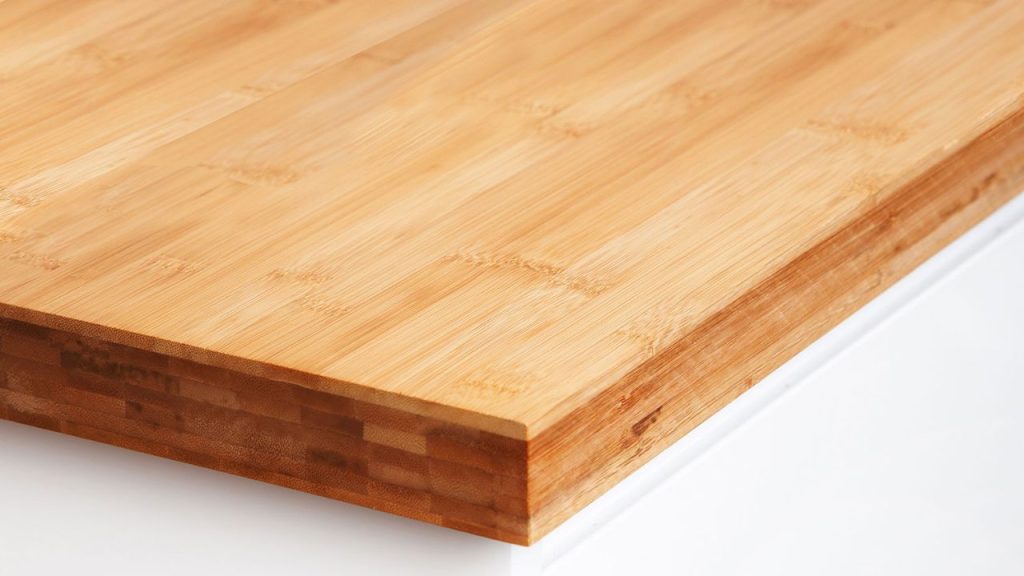
Proper Cleaning
Maintaining your bamboo countertop begins with proper cleaning. To keep it stain-resistant and looking its best, gently use a mild soap and a soft sponge to clean the surface.
Avoid harsh chemicals or abrasive cleaning materials, as they can damage the finish. Drying the countertop thoroughly after wiping it down is essential to prevent water damage.
Regular cleaning will help preserve the beauty and functionality of your countertop for years to come.
Sealants and Treatments
To ensure your bamboo countertop remains water-resistant and looks pristine, it is essential to apply sealants and treatments.
These help maintain the non-porous quality of the material and increase its durability. Some popular options include mineral oil, tung oil, and beeswax.
Depending on your needs and preferences, a combination of potential treatments can be applied. Regularly applying these sealants will protect your countertop’s surface and enhance its natural beauty.
Avoid using laminate or adhesive-based options when selecting a sealant, as they may harm the countertop’s surface or functionality.
Instead, opt for finishes explicitly designed for use on bamboo surfaces, ensuring compatibility and lasting protection.
Repairing Damage
Over time, your bamboo countertop may show signs of wear and tear. Luckily, bamboo is easy to repair and refinish, allowing you to refresh your kitchen’s appearance without needing a replacement.
If your countertop has scratches or dents, it can be sanded to remove the damaged layer. Once sanded, apply a new coat of your preferred finish to protect the surface and restore its appearance.
In case of significant damage, such as deep gouges, you may need assistance from professional repair services or consider replacing the affected section of the countertop.
It is essential to properly address any damage to maintain the durability and functionality of your bamboo countertop.
5. Health and Safety Considerations
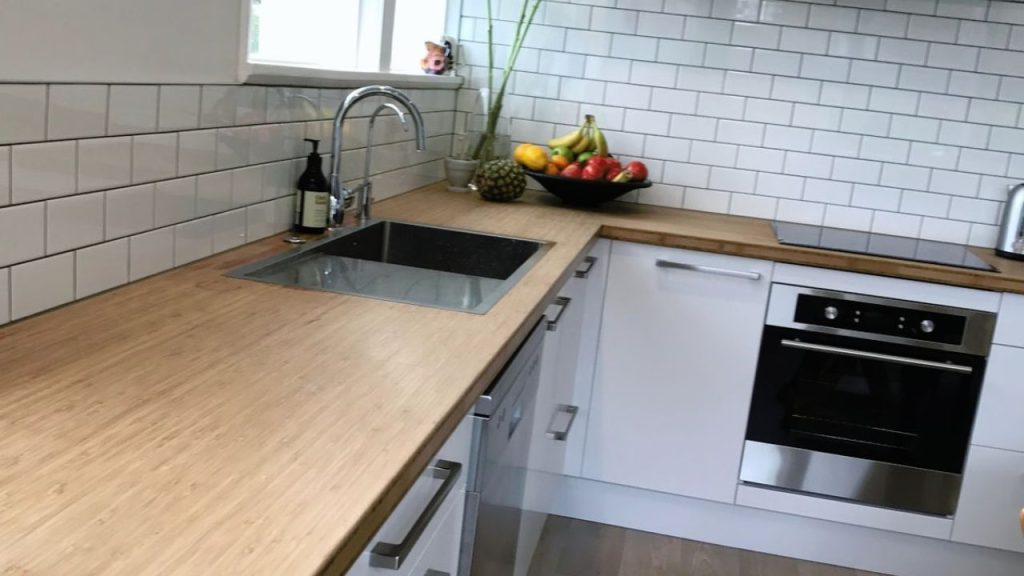
Chemical Components
When considering bamboo countertops, it’s essential to be aware of the chemicals used during manufacturing.
To create a durable surface, some bamboo countertops may be chemically treated with adhesives, glues, or other substances.
As a consumer, you should look for countertops that use low-VOC (volatile organic compounds) adhesives and finishes, as these will help reduce potential health risks from off-gassing.
Heat Resistance
Bamboo countertops are relatively heat-resistant, but high temperatures can damage them.
It’s always a good idea to use trivets or hot pads when placing hot pots and pans on your countertop to prevent scorching or warping.
While bamboo might be able to withstand occasional exposure to heat, it’s better to be cautious and protect the surface for long-term durability.
Anti-Bacterial Qualities
One of the attractive features of bamboo countertops is their natural antibacterial properties. Bamboo contains anti-bacterial agents that can help inhibit the growth of bacteria on its surface.
However, it’s essential to maintain proper cleaning and hygiene practices, as bamboo is not immune to contamination.
Regular cleaning with mild soap and water will help maintain the surface and preserve its antibacterial qualities.
Remember, your bamboo countertop may have additional oils or finishes applied during manufacturing, so following the manufacturer’s care and maintenance instructions is essential.
Frequently Asked Questions
What is the durability of bamboo countertops?
Bamboo countertops are known for their durability and hardness. They can withstand daily wear and tear. However, if a scratch does occur, it’s easy to re-sand and re-seal the surface. Remember that excessive moisture and heat can still damage bamboo countertops, so use trivets and cutting boards when needed.
How do you maintain bamboo countertops?
To maintain your bamboo countertops, use a gentle neutral pH cleaning product on both the countertop and your skin. Regular maintenance is important to keep your countertops looking their best. You can also apply a quality oil periodically to make the surface more stain-resistant.
How eco-friendly are bamboo countertops?
Bamboo countertops are considered eco-friendly because bamboo is a sustainable and renewable resource. It grows much faster than traditional hardwood trees and uses less land, which benefits the environment. Replacing plastic-based materials with natural materials like bamboo also helps reduce our reliance on non-renewable resources.
What is the cost comparison between bamboo and other countertop materials?
Bamboo countertops are generally more affordable than other countertop materials such as quartz, marble, or granite. The shorter time frame for bamboo growth and the simpler manufacturing process contribute to its cost-effectiveness. However, prices may still vary depending on the specific type of bamboo countertop and the manufacturer.
Are bamboo countertops resistant to bacteria and germs?
Yes, bamboo countertops are naturally resistant to bacteria. They also prevent mold and mildew growth, making them a hygienic choice for your kitchen. It’s still important to keep your countertops clean to maintain their sanitary qualities.
Do bamboo countertops stain easily?
Bamboo countertops can be prone to staining if not properly sealed and maintained. Applying a quality oil regularly will help increase stain resistance. Also, it’s advised to clean up spills quickly and use cutting boards to avoid damage from food and liquids.
